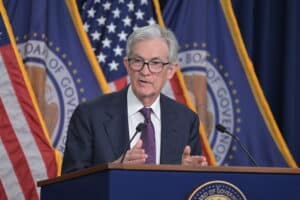
Federal Reserve Chair Jerome Powell answers reporters' questions on Dec. 18, 2024 following a meeting of the Federal Open Markets Committee. Photo courtesy of the Federal Reserve/Handout
The Trump administration’s expansive new tariffs will likely lead to higher inflation and slower growth, and the Federal Reserve will focus on keeping price increases temporary, Fed Chair Jerome Powell said Friday.
Powell said in written remarks that the tariffs, and their impacts on the economy and inflation, are “significantly larger than expected.” He also said that the import taxes are “highly likely” to lead to “at least a temporary rise in inflation,” but added that “it is also possible that the effects could be more persistent.”
“Our obligation is to … make certain that a one-time increase in the price level does not become an ongoing inflation problem,” Powell said in remarks being delivered in Arlington, Virginia.
Powell’s focus on inflation suggests that the Fed will likely keep its benchmark interest rate unchanged at about 4.3 percent in the coming months. That is likely to disappoint Wall Street investors, who now expect five interest rate cuts this year, a number that has increased since President Donald Trump announced the tariffs Wednesday.
Economists forecast that the tariffs will weaken the economy, possibly threaten hiring, and push up prices. In that scenario, the Fed could cut rates to bolster the economy, or it could keep rates unchanged – or even hike them – to combat inflation. Powell’s comments suggest the Fed will mostly focus on inflation.
Powell’s remarks come two days after Trump unveiled sweeping tariffs that have upended the global economy, prompted retaliatory moves by China, and sent stock prices in the U.S. and overseas plunging.
Weaker growth and higher prices are a tricky combination for the Fed. Typically the central bank would reduce its key interest rate to lower borrowing costs and spur the economy in the event of slower growth, while it would raise rates – or keep them elevated – to slow spending and combat inflation.
“The Fed is in a tough spot with inflation set to accelerate and the economy poised to slow,” said Kathy Bostjancic, chief economist at Nationwide.
Some positive news arrived Friday when the government reported that hiring accelerated in March, with 228,000 jobs added, though the unemployment rate ticked up to 4.2 percent, from 4.1 percent.
Yet those figures measure hiring in mid-March, before the scope of the duties became clear. The tariffs have also raised uncertainty about how the economy will fare in the coming months, which could limit businesses’ willingness to invest and hire.
While the Fed hasn’t moved yet, and now may not move its rates at its next meeting in May, mortgage rates still dropped this week thanks to falling interest rates on U.S. Treasury bonds.
The average rate on a 30-year fixed-rate mortgage fell to 6.64 percent from 6.65 percent last week, mortgage buyer Freddie Mac said Thursday. A year ago, the rate averaged 6.82 percent.
The average rate has mostly trended lower since reaching just over 7 percent in mid-January. When mortgage rates decline, they boost homebuyers’ purchasing power.
Mortgage rates are influenced by factors including bond market investors’ expectations for future inflation, global demand for U.S. Treasurys and the Federal Reserve’s interest rate policy decisions.
The overall decline this year in the average rate on a 30-year mortgage loosely follows moves in the 10-year Treasury yield, which lenders use as a guide to pricing home loans.
The yield, which was nearing 4.8 percent in mid-January, has mostly fallen since then, amid signs that the economy is slowing and worries that tariffs imposed by the Trump administration on goods imported from around the globe could hurt economic growth and fuel inflation.
The yield slid to 4.06 percent Thursday as a sharp sell-off on Wall Street following the White House’s latest and most severe volley of tariffs fueled expectations among bond investors that the Fed may have to cut its main interest rate if the economy sours.
“The 10-year Treasury has dipped even further this morning as investors are exiting the stock market, so it’s likely that mortgage rates will continue to come down in the coming months as a result,” said Joel Berner, senior economist at Realtor.com. “This shock to the system will be felt in the housing market for the rest of the year.”
Recent forecasts by housing economists generally called for the average rate on a 30-year mortgage to remain around 6.5 percent this year.
Material from other Associated Press reports was used in this story.





